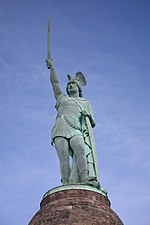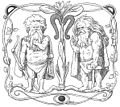Dragons, or worms, are present in Germanic mythology and wider folklore, where they are often portrayed as large venomous serpents. Especially in later...
24 KB (2,353 words) - 12:34, 8 January 2024
Germanic folklore, the lindworm is a legendary creature that resembles a wingless dragon or serpent. The most famous lindworm in Norse and Germanic mythology...
54 KB (6,867 words) - 07:50, 6 May 2024
lists of dragons. List of dragons in mythology and folklore Dragons in Greek mythology Germanic dragon Slavic dragon European dragon Chinese dragon Japanese...
579 bytes (67 words) - 08:14, 2 May 2022
Proto-Germanic paganism was the beliefs of the speakers of Proto-Germanic and includes topics such as the Germanic mythology, legendry, and folk beliefs...
72 KB (1,709 words) - 16:41, 9 May 2024
Lindworm (category European dragons)
The lindworm (worm meaning snake, see germanic dragon), also spelled lindwyrm or lindwurm, is a mythical creature in Northern, Western and Central European...
18 KB (1,981 words) - 21:23, 30 April 2024
the free dictionary. Wyrm may refer to: Germanic dragon, a creature from which the modern word originated Dragon Sea serpent Wyrms (comics), a six-issue...
1 KB (140 words) - 16:44, 22 April 2024
Germanic paganism or Germanic religion refers to the traditional, culturally significant religion of the Germanic peoples. With a chronological range...
128 KB (15,972 words) - 22:22, 10 February 2024
Esgaroth. Tolkien's dragons were inspired by medieval stories, including those about Fafnir in Germanic mythology and the Beowulf dragon. The folklorist Sandra...
21 KB (2,529 words) - 09:33, 24 April 2024
Scottish) – Monster with half a body Fafnir (Germanic mythology) – Dwarf who was cursed and turned into a dragon. He was later slain by Sigurd in the Saga...
3 KB (276 words) - 21:20, 29 December 2023
common to Germanic tradition, the Beowulf poet was the first to combine features and present a distinctive fire-breathing dragon. The Beowulf dragon was adapted...
24 KB (3,067 words) - 12:08, 13 May 2024
Continental Germanic mythology. It was a key element of Germanic paganism. As the Germanic languages developed from Proto-Indo-European language, Germanic mythology...
9 KB (970 words) - 16:27, 5 December 2023
list of dragons in mythology and folklore. This is a list of European dragons. Azazel from the Abrahamic religions, is described as a dragon in the Apocalypse...
44 KB (873 words) - 22:25, 19 February 2024
Jörmungandr (category Germanic mythology)
4to Thor and Jörmungandr by Lorenz Frølich Apep Bakunawa European dragon Germanic dragon Horned Serpent Lernaean Hydra Leviathan Makara (Hindu mythology)...
19 KB (1,948 words) - 03:09, 14 May 2024
Odin (redirect from Germanic Mercury)
Odin (/ˈoʊdɪn/; from Old Norse: Óðinn) is a widely revered god in Germanic paganism. Norse mythology, the source of most surviving information about him...
78 KB (8,901 words) - 09:19, 16 May 2024
(Assyrian) – Winged demon Limnades (Greek) – Lake nymph Lindworm (Germanic) – Dragon Ljósálfar (Norse) – Sunlight spirits; the Light Elves Ljubi (Albanian)...
5 KB (459 words) - 21:23, 29 December 2023
Look up ormr in Wiktionary, the free dictionary. Ormr may refer to: Germanic dragon, a being often referred to in Old Norse as an "ormr" Bloom Image Editor...
253 bytes (72 words) - 21:42, 23 November 2023
A dragon is a magical legendary creature that appears in the folklore of multiple cultures worldwide. Beliefs about dragons vary considerably through...
114 KB (12,663 words) - 10:43, 20 May 2024
Germanic heroic legend (German: germanische Heldensage) is the heroic literary tradition of the Germanic-speaking peoples, most of which originates or...
109 KB (13,809 words) - 04:52, 24 May 2024
Fáfnir (category European dragons)
In Germanic heroic legend and folklore, Fáfnir is a worm or dragon slain by a member of the Völsung family, typically Sigurð. In Nordic mythology, he...
41 KB (5,098 words) - 14:16, 15 May 2024
(Middle High German: Sîvrit) is a legendary hero of Germanic heroic legend, who killed a dragon—known in some Old Norse sources as Fáfnir—and who was...
73 KB (10,092 words) - 14:09, 16 May 2024
Look up draca in Wiktionary, the free dictionary. Draca may refer to: Germanic dragon Drača, a village in Serbia This disambiguation page lists articles...
125 bytes (50 words) - 19:20, 24 February 2022
Arminius (section Old Germanic sagas)
18/17 BC–AD 21) was a chieftain of the Germanic Cherusci tribe who is best known for commanding an alliance of Germanic tribes at the Battle of the Teutoburg...
35 KB (3,975 words) - 11:27, 21 May 2024
Dwarf (folklore) (redirect from Dwarf (Germanic mythology))
A dwarf (pl. dwarfs or dwarves) is a type of supernatural being in Germanic folklore. Accounts of dwarfs vary significantly throughout history; however...
40 KB (5,088 words) - 13:28, 4 May 2024
in Germanic paganism and Germanic mythology, both as individuals (sacred trees) and in groups (sacred groves). The central role of trees in Germanic religion...
17 KB (1,594 words) - 11:57, 2 May 2024
of the triangle together. According to Rudolf Koch, the Dragon's Eye is an ancient Germanic symbol. According to Carl G. Liungman's Dictionary of Symbols...
3 KB (309 words) - 06:08, 23 May 2024
Edgar C. (1986). "The Background of Germanic Cosmogonic Myths". In Brogyanyi, Bela; Krömmelbein, Thomas (eds.). Germanic Dialects: Linguistic and Philological...
26 KB (2,656 words) - 03:27, 7 December 2023
The early Germanic calendars were the regional calendars used among the early Germanic peoples before they adopted the Julian calendar in the Early Middle...
39 KB (3,177 words) - 05:16, 8 April 2024
How to Train Your Dragon: Music from the Motion Picture is a soundtrack album composed by John Powell for the film of the same name and released by Varèse...
22 KB (1,575 words) - 12:53, 2 May 2024
Nixie (folklore) (category Articles containing Proto-Germanic-language text)
shapeshifting water spirits in Germanic mythology and folklore. Under a variety of names, they are common to the stories of all Germanic peoples, although they...
30 KB (4,069 words) - 06:58, 2 April 2024
Nāga (redirect from Mekong Dragon)
generically to mean "snake". The word is cognate with English 'snake', Germanic: *snēk-a-, Proto-IE: *(s)nēg-o- (with s-mobile). Alternatively, an Indo-European...
73 KB (8,067 words) - 13:10, 20 May 2024



















